"Someday We'll Be Together" is a song written by Johnny Bristol, Jackey Beavers, and Harvey Fuqua. It was the last of twelve American number-one pop singles for Diana Ross & the Supremes on the Motown label. Although it was released as the final Supremes song featuring Diana Ross, who left the group for a solo career in January 1970, it was recorded as Ross' first solo single and Supremes members Mary Wilson and Cindy Birdsong do not sing on the recording. Both appear on the B-side, "He's My Sunny Boy".
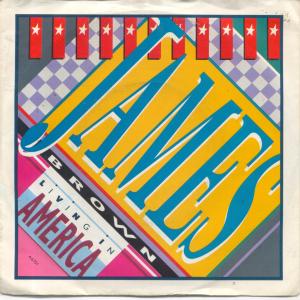
"Living in America" is a 1985 song composed by Dan Hartman and Charlie Midnight and performed by James Brown. It was released as a single in 1985 and reached number 4 on the Billboard Hot 100 chart. The song entered the Billboard Top 40 on January 11, 1986, and remained on the chart for 11 weeks. It also became a top five hit in the United Kingdom, peaking at number 5 on the UK Singles Chart; it was his only top 10 single in the UK. It was his first Top 40 hit in ten years on the US pop charts, and it would also be his last. In 1987, it was nominated for a Grammy Award for Best R&B Song and won Brown a Grammy Award for Best Male R&B Vocal Performance.
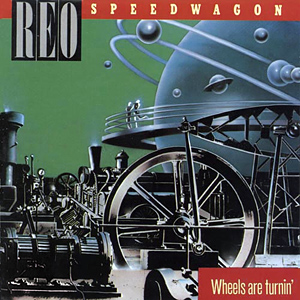
Wheels Are Turnin' is the eleventh studio album by REO Speedwagon, released in November 1984. It reached No. 7 on the Billboard 200. The lead single was "I Do' Wanna Know," which stalled at #29 on the Billboard Hot 100. The second single, "Can't Fight This Feeling," was REO's second and longest-running number one single. Other singles released were "One Lonely Night" and "Live Every Moment". These singles also reached the Top 40 of the Billboard Hot 100, reaching #19 and #34, respectively. The singles from the album also had success on other Billboard charts: "Can't Fight This Feeling" and "I Do' Wanna Know" each reached #5 on the Mainstream Rock chart, with "One Lonely Night" reaching #17, and "Can't Fight This Feeling" and "One Lonely Night" reached #3 and #10, respectively on the Adult Contemporary chart.
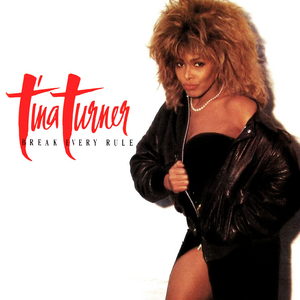
Break Every Rule is the sixth solo studio album by Tina Turner. It was released on September 8, 1986, through Capitol Records. It was the follow-up to Turner's globally successful comeback album, Private Dancer, released two years earlier. The lead single "Typical Male" peaked at number two for three consecutive weeks in October 1986, while "Two People" and "What You Get Is What You See" reached the top 20. "Back Where You Started" earned Turner her third consecutive Grammy Award for Best Rock Vocal Performance, Female in 1987. It was Turner's first solo album of original songs.

"Love and Understanding" is a song by American singer and actress Cher from her 20th studio album, Love Hurts (1991). Written by Diane Warren and produced by Warren and Guy Roche, it was released as the album's lead single in May 1991 by Geffen for the North American and Oceanian markets. B-side "Trail of Broken Hearts" appears on the soundtrack to the Tom Cruise film Days of Thunder and is not available on any Cher album.

Heaven on Earth is the second solo studio album by American singer Belinda Carlisle. It was released on October 5, 1987, by MCA Records. Three singles reached the top 10 of the US Billboard Hot 100, including the number-one single and Carlisle's signature song "Heaven Is a Place on Earth". The album has been certified triple Platinum in the United Kingdom and Platinum in many countries, including the United States.

In Your Face is the second album by the hard rock band Kingdom Come, released in 1989. This is the band's final album to be recorded with the original lineup of vocalist Lenny Wolf, lead guitarist Danny Stag, rhythm guitarist Rick Steier, bassist Johnny B. Frank and drummer James Kottak.

"Hard Habit to Break" is a song written by Steve Kipner and John Lewis Parker, produced and arranged by David Foster and recorded by the group Chicago for their 1984 album Chicago 17, with Bill Champlin and Peter Cetera sharing lead vocals. Released as the second single from the album, it reached No. 3 on the Billboard Hot 100 and was prevented from charting higher by "Caribbean Queen" by Billy Ocean and "I Just Called to Say I Love You" by Stevie Wonder. "Hard Habit to Break" also peaked at No. 3 on the Adult Contemporary chart. The lyrics of the song appear to describe a man having a hard time getting over a significant other getting away after he took her for granted and she left him for someone else. Overseas it peaked at No. 8 on the UK Singles Chart.
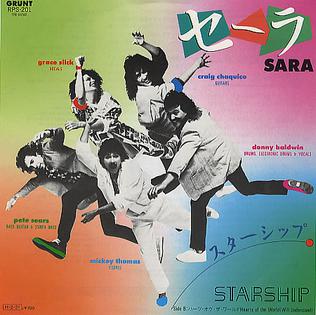
"Sara" is a song recorded by the American rock band Starship which reached number-one on the U.S. Billboard Hot 100 chart on March 15, 1986. It was sung by Mickey Thomas, of the newly renamed band Starship, from their first album Knee Deep in the Hoopla, and Grace Slick provided the backing vocals.
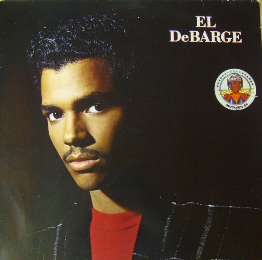
El DeBarge is the debut solo album by El DeBarge. It was released on May 6, 1986 through Gordy Records and featured the three hit singles, "Who's Johnny," which peaked at #3 on the Billboard Hot 100, "Love Always," which reached #43, and "Someone," which was a Top 20 Billboard A/C hit and made it to #70 on the Hot 100. Singer/actress Vanity featured on backing vocals on the track, "Secrets Of The Night". This album was certified by RIAA as gold in September, 1986, selling over 500,000 copies.
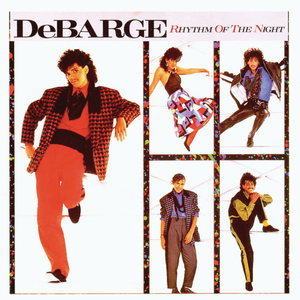
Rhythm of the Night is the fourth studio album by DeBarge, released by Gordy Records on March 14, 1985. It reached #19 on the Billboard 200 and #3 on the R&B Album Chart. The album was also certified Gold by the RIAA.

"All This Love" is a single by DeBarge, released on October 17, 1982. The song was released as the third and final single from their second studio album of the same title on the Gordy label. The single would help DeBarge rise to R&B stardom. A cover version of the song was recorded by Patti LaBelle on her 1994 gold album Gems. A video for her version was also filmed.

"Rhythm of the Night" is a song by American musical recording group DeBarge, written by Diane Warren and released on February 23, 1985, on the Motown label as the first single from their fourth studio album of the same name. The song was Warren's breakthrough as a songwriter and was the biggest hit recorded by the Motown family singing group, peaking at number three on the Billboard Hot 100.

"Who's Holding Donna Now" is a 1985 hit single recorded by DeBarge for the Gordy label. It was their second consecutive Top 10 Pop hit in the U. S. after the release of "Rhythm of the Night".

All This Love is the second studio album by DeBarge, released by Gordy Records on July 22, 1982.
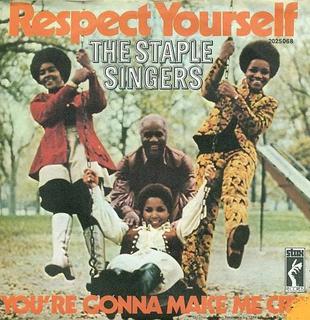
"Respect Yourself" is a song by American R&B/gospel group the Staple Singers. Released in late 1971 from their album Be Altitude: Respect Yourself, the song became a crossover hit. The Staple Singers' version peaked at No. 12 on the Hot 100, No. 2 on the Hot Soul Singles chart, and is one of the group's most recognizable hits. In 2002, the song was inducted into the Grammy Hall of Fame, and in 2010 it was ranked #468 on the Rolling Stone list of the 500 Greatest Songs of All Time, moving down 4 spots from #464 in 2004.
"By the Time This Night Is Over" is a song by American musician Kenny G and singer-songwriter Peabo Bryson, released as a single from Kenny G's sixth studio album, Breathless, in 1992 and from Bryson's 16th studio album, Through the Fire, in 1994. The song peaked at number 25 on the US Billboard Hot 100 chart and number 37 on the Billboard Hot R&B Singles. On the Hot Adult Contemporary Tracks chart, "By the Time This Night Is Over" spent two weeks at number one, while in Canada, the song reached number six on the RPM Top Singles chart and number one on the RPM Adult Contemporary chart.
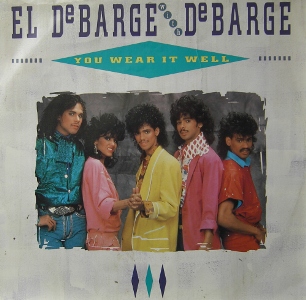
"You Wear It Well" is a song recorded by DeBarge for the Gordy label. It was released as the third single off their fourth album, Rhythm of the Night; the single release was credited to "El DeBarge with DeBarge."
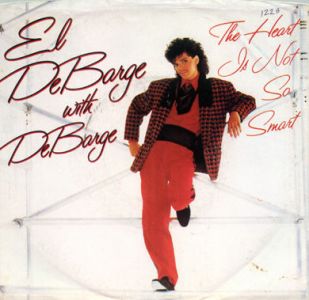
"The Heart Is Not So Smart" was a moderate hit song recorded by DeBarge for the Gordy label credited to "El DeBarge with DeBarge" on the single release. Relying on an outside producer and songwriters, this song was recorded and released as the fourth single from Debarge's fourth album, Rhythm of the Night.
This is the discography documenting albums and singles released by American R&B singer El DeBarge.

















